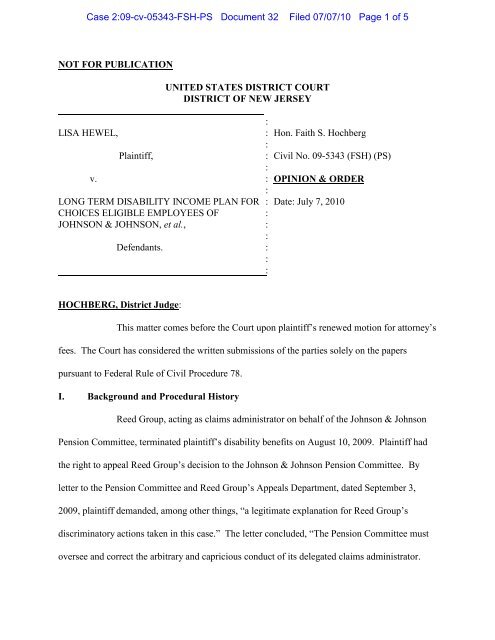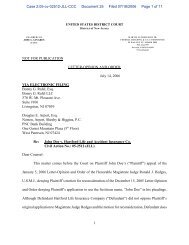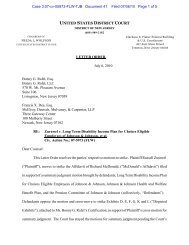Opinion & Order Granting Plaintiff's Motion for Attorney's Fees
Opinion & Order Granting Plaintiff's Motion for Attorney's Fees
Opinion & Order Granting Plaintiff's Motion for Attorney's Fees
Create successful ePaper yourself
Turn your PDF publications into a flip-book with our unique Google optimized e-Paper software.
Case 2:09-cv-05343-FSH-PS Document 32 Filed 07/07/10 Page 1 of 5<br />
NOT FOR PUBLICATION<br />
UNITED STATES DISTRICT COURT<br />
DISTRICT OF NEW JERSEY<br />
LISA HEWEL,<br />
v.<br />
Plaintiff,<br />
LONG TERM DISABILITY INCOME PLAN FOR<br />
CHOICES ELIGIBLE EMPLOYEES OF<br />
JOHNSON & JOHNSON, et al.,<br />
Defendants.<br />
:<br />
:<br />
:<br />
:<br />
:<br />
:<br />
:<br />
:<br />
:<br />
:<br />
:<br />
:<br />
:<br />
:<br />
Hon. Faith S. Hochberg<br />
Civil No. 09-5343 (FSH) (PS)<br />
OPINION & ORDER<br />
Date: July 7, 2010<br />
HOCHBERG, District Judge:<br />
This matter comes be<strong>for</strong>e the Court upon plaintiff’s renewed motion <strong>for</strong> attorney’s<br />
fees. The Court has considered the written submissions of the parties solely on the papers<br />
pursuant to Federal Rule of Civil Procedure 78.<br />
I. Background and Procedural History<br />
Reed Group, acting as claims administrator on behalf of the Johnson & Johnson<br />
Pension Committee, terminated plaintiff’s disability benefits on August 10, 2009. Plaintiff had<br />
the right to appeal Reed Group’s decision to the Johnson & Johnson Pension Committee. By<br />
letter to the Pension Committee and Reed Group’s Appeals Department, dated September 3,<br />
2009, plaintiff demanded, among other things, “a legitimate explanation <strong>for</strong> Reed Group’s<br />
discriminatory actions taken in this case.” The letter concluded, “The Pension Committee must<br />
oversee and correct the arbitrary and capricious conduct of its delegated claims administrator.
Case 2:09-cv-05343-FSH-PS Document 32 Filed 07/07/10 Page 2 of 5<br />
However, I am convinced that Johnson & Johnson will not be neutral or independent in this<br />
process as it has a significant financial stake in the outcome.” The letter did not expressly state<br />
that it was an “appeal,” and the Court commented in its March 17, 2010 <strong>Order</strong> dismissing the<br />
1<br />
case as moot that the September 3, 2009 letter “does not purport to be an appeal.” However, the<br />
letter clearly used much of the terminology that an appeal uses; indeed, if it had used the word<br />
“appeal,” with no other changes to the letter, it would have clearly stated the grounds <strong>for</strong> an<br />
appeal. The Pension Committee ignored the letter.<br />
Plaintiff filed suit on October 20, 2009. In her Complaint and in a subsequent<br />
letter to the Pension Committee dated October 27, 2009, plaintiff alleged that her September 3,<br />
2009 letter constituted an appeal of the termination of her disability benefits. By letter dated<br />
October 29, 2009, the Johnson & Johnson Pension Committee responded that plaintiff had not<br />
expressly announced her intention to appeal in the September 3, 2009 letter, and it acknowledged<br />
plaintiff’s October 27, 2009 letter as her final appeal. Plaintiff’s benefits were restored in full on<br />
appeal. In the Final Appeal Determination, the Pension Committee acknowledged both the<br />
September 3, 2009 and October 27, 2009 letters as plaintiff’s final appeal.<br />
Defendants filed a motion to dismiss on December 21, 2009; plaintiff crossmoved<br />
<strong>for</strong> an award of attorney’s fees pursuant to 29 U.S.C. § 1132(g). On March 17, 2010, the<br />
Court dismissed the complaint as moot and stayed the motion <strong>for</strong> attorney’s fees to await the<br />
decision of the Supreme Court in Hardt v. Reliance Standard Life Insurance Co. On May 24,<br />
2010, the Supreme Court issued a decision in Hardt. Accordingly, plaintiff renewed her motion<br />
1<br />
The Court did not rule on this ground or hold that plaintiff failed to exhaust her<br />
administrative remedies.<br />
2
Case 2:09-cv-05343-FSH-PS Document 32 Filed 07/07/10 Page 3 of 5<br />
<strong>for</strong> attorney’s fees.<br />
II.<br />
Discussion<br />
The power to award a party attorney’s fees pursuant to 29 U.S.C. § 1132(g) is<br />
committed to the discretion of the District Court, so long as the party achieves “some degree of<br />
success on the merits.” Hardt v. Reliance Standard Life Ins. Co., --- S. Ct. ----, 2010 WL<br />
2025127, at *9 (2010). The recipient of a fee award need not be a “prevailing party” under the<br />
meaning of Buckhannon Board & Care Home, Inc. v. West Virginia Department of Health and<br />
Human Resources, 532 U.S. 598 (2001). Id. at *7.<br />
Although the substance of the Complaint is moot due to the restoration of<br />
plaintiff’s benefits, as set <strong>for</strong>th in the Court’s March 17, 2010 <strong>Order</strong>, plaintiff has nevertheless<br />
achieved “some degree of success on the merits.” By bringing the Complaint and through<br />
subsequent correspondence, plaintiff caused the Pension Committee to recognize her appeal of<br />
Reed Group’s decision. While plaintiff’s September 3, 2009 letter was inartfully drafted, it<br />
clearly demanded that the Pension Committee “correct the arbitrary and capricious conduct of its<br />
delegated claims administrator” and enumerated various medical and procedural reasons why<br />
Reed Group’s termination of plaintiff’s benefits was erroneous. It was addressed to both the<br />
Pension Committee and Reed Group’s Appeals Department. The Pension Committee could have<br />
easily inferred that plaintiff was in fact appealing the decision of the Reed Group, or,<br />
alternatively, its staff could (and should) have sought clarification from plaintiff’s counsel rather<br />
than simply ignoring the letter. Yet it remained silent, and only after the instant lawsuit<br />
commenced did it respond to the letter or acknowledge that it was an appeal. Plaintiff then<br />
prevailed on the merits of her administrative claim.<br />
3
Case 2:09-cv-05343-FSH-PS Document 32 Filed 07/07/10 Page 4 of 5<br />
The Court is persuaded that plaintiff should be awarded attorney’s fees <strong>for</strong> work<br />
per<strong>for</strong>med on this lawsuit from its inception, but Plaintiff is not entitled to fees incurred <strong>for</strong><br />
pursuing her administrative claim and appeal. See Hahnemann Univ. Hosp. v. All Shore, 514<br />
F.3d 300, 313 (3d Cir. 2008). Be<strong>for</strong>e being awarded a precise fee amount, Plaintiff shall produce<br />
actual detailed billing records showing the work per<strong>for</strong>med solely on the instant case, and<br />
omitting any billing entries <strong>for</strong> work per<strong>for</strong>med on the administrative action, including the<br />
administrative appeals process.<br />
In exercising its discretion under 29 U.S.C. § 1132(g), the Court need not<br />
expressly evaluate the Ursic factors, but rather is free to consider any factors that it deems<br />
relevant in exercising its discretion. See Hardt, 2010 WL 2025127, at *9 (“Because these five<br />
factors bear no obvious relation to § 1132(g)(1)’s text or to our fee-shifting jurisprudence, they<br />
2<br />
are not required <strong>for</strong> channeling a court’s discretion when awarding fees under this section.”).<br />
Nevertheless, certain Ursic factors buttress the Court’s conclusion that a fee award is warranted.<br />
As noted above, plaintiff’s position on the merits appears to have been meritorious, and the<br />
termination of benefits erroneous. Awarding fees will encourage attorneys to represent ERISA<br />
plan beneficiaries, whose income – and ability to pay legal fees – might be denied, and deter plan<br />
administrators from wrongfully terminating benefits and elevating <strong>for</strong>m over substance in<br />
construing letters that seek to overturn administrative rulings. Administrators should be mindful<br />
2<br />
Although the Supreme Court was referring to precedent from a different circuit,<br />
the factors that it cited were identical to those set <strong>for</strong>th in Ursic v. Bethlehem Mines, 719 F.2d<br />
670 (3d Cir. 1983). The Ursic factors are: “(1) the offending parties’ culpability or bad faith; (2)<br />
the ability of the offending parties to satisfy an award of attorneys’ fees; (3) the deterent effect of<br />
an award of attorneys’ fees against the offending parties; (4) the benefit conferred on members of<br />
the pension plan as a whole; and (5) the relative merits of the parties’ position.” Id. at 673.<br />
4
Case 2:09-cv-05343-FSH-PS Document 32 Filed 07/07/10 Page 5 of 5<br />
of the need to act in the best interest of the plan beneficiaries. The Court gives little weight to<br />
defendants’ ability to satisfy the fee award, but it would not appear to be in question. Finally, on<br />
the facts be<strong>for</strong>e it, the Court is not prepared to find that either party acted in bad faith.<br />
III.<br />
Conclusion & <strong>Order</strong><br />
For the <strong>for</strong>egoing reasons, it is ORDERED that Plaintiff’s motion <strong>for</strong> attorney’s<br />
fees pursuant to 29 U.S.C. § 1132(g) is hereby GRANTED solely <strong>for</strong> fees incurred in<br />
prosecuting the instant lawsuit; and it is<br />
ORDERED that within seven (7) days, plaintiff shall submit detailed attorney fee<br />
records in accordance with the terms of this <strong>Opinion</strong>; and it is<br />
ORDERED that the fee records shall be properly annotated to reflect the date,<br />
time spent, timekeeper, billing rate, and legal work per<strong>for</strong>med; and it is<br />
ORDERED that defendant may object to any fees claimed within seven (7) days<br />
of plaintiff’s submission.<br />
/s/ Faith S. Hochberg<br />
Hon. Faith S. Hochberg, U.S.D.J.<br />
5




